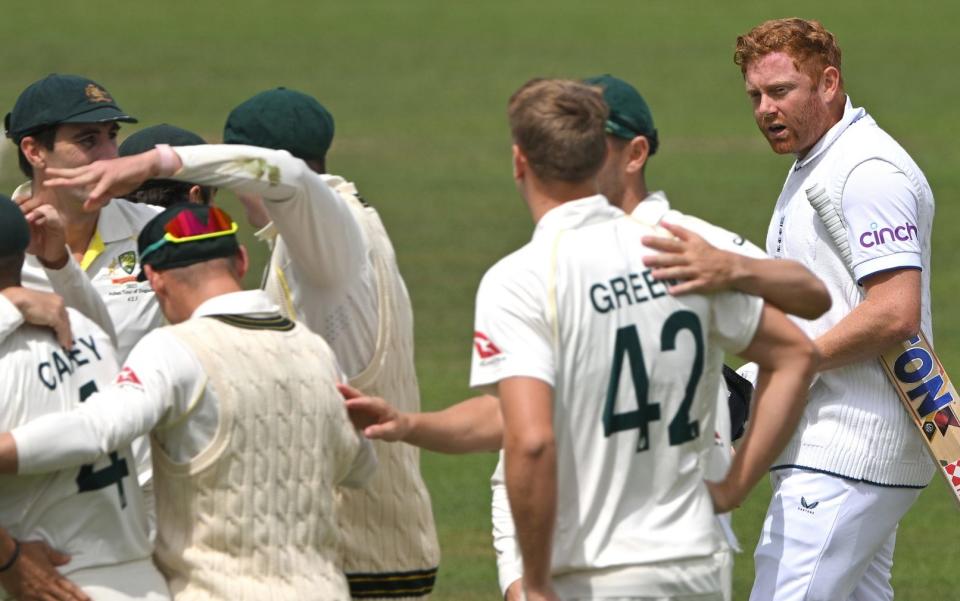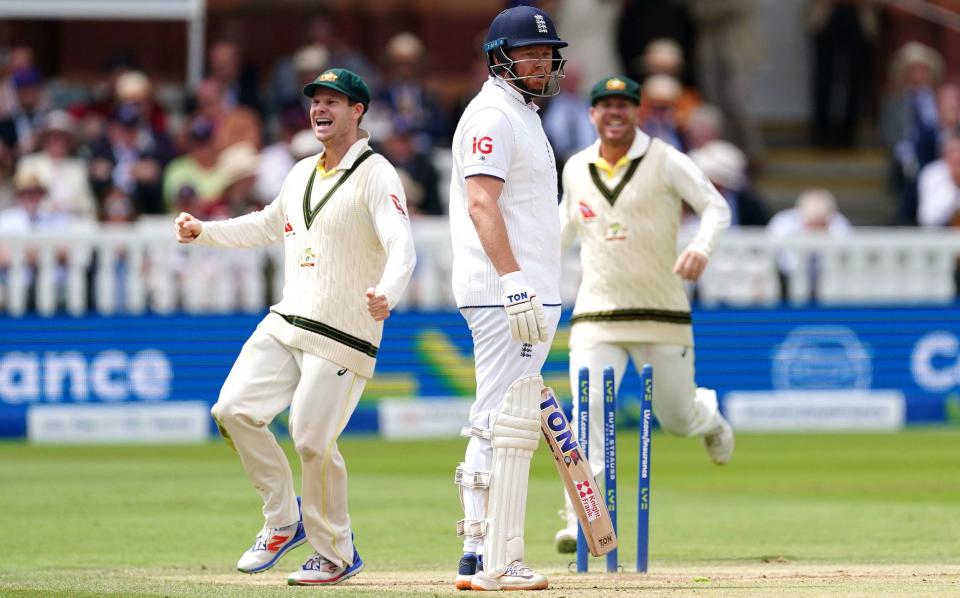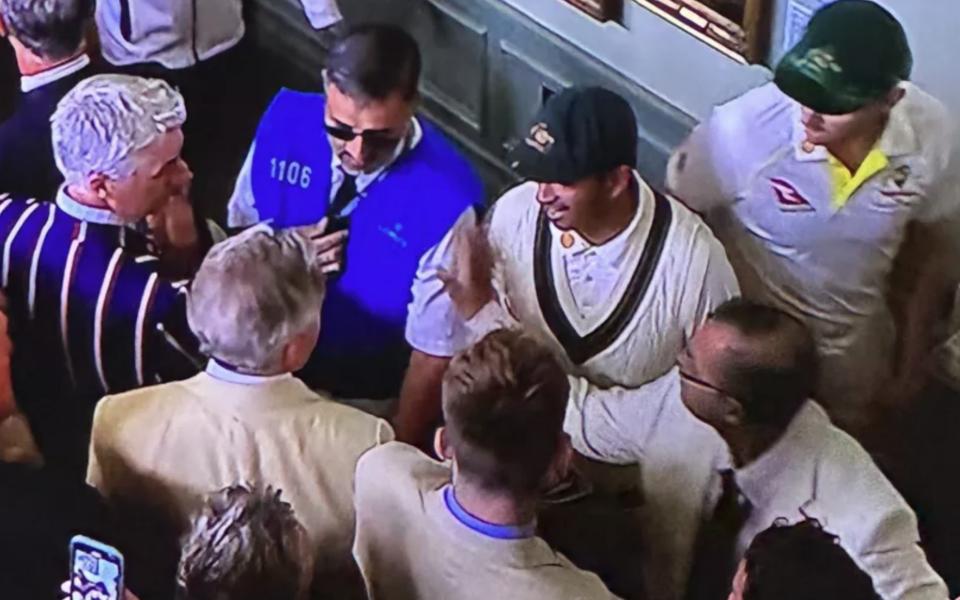Jonny Bairstow opens up on Lord’s stumping: ‘It would not enter my mind – I have never seen it happen’

Jonny Bairstow is reluctant to talk about the S-word. It is nearly a month since he was stumped during the second Test at Lord’s – a moment of sharp practice or clever thinking, depending on where you sit in a debate in which everyone has had their say. The Lord’s Test brought out the best and the worst of Bazball. It also brought out the worst in others: many who were there on the final day later reflected on their behaviour with regret.
Chatting after a net session at the Oval, Bairstow has had time to consider the incident that changed the mood of the Ashes. He has spoken only once since Lord’s, during a spiky press conference after his unbeaten 99 at Old Trafford in which he defiantly replied “no comment” to questions about the stumping. Even now, in the presence of a single Dictaphone, his instinct is to pull down the shutters.
“Jonny, we would not be doing our jobs if we didn’t ask you this. Lord’s – how do you look back on it now?” There is no need to mention the stumping: he knows what we mean.
“I don’t want to give any comment on it. Not until way down the line.”
“Can you give us anything?”
“No, no. It was just one of those things.”
“Do you wish you’d stayed in your crease?”
“I’m not answering it... I was so close to saying something there. No, no, no.”
“Go on. Can you give us one line?”
“No comment. It is what it is.”
Then he begins to talk. “It wouldn’t come into my mind, you know, because you’re stood in your crease. If you’re starting in your crease, then it wouldn’t even enter my mind to do that. If you’re batting out of your crease...”
He is referring to Marnus Labuschagne. As the row raged, Australians pointed out online that Bairstow had previously thrown at the stumps when Labuschagne was batting. But, for Bairstow, that was different, because Labuschagne had taken guard outside his crease. Bairstow was in his crease when he ignored a bouncer from Cameron Green, looked up and cursorily marked his guard. He hadn’t yet left it when Alex Carey underarmed the ball towards the stumps. By the time the ball hit them, Bairstow was walking towards Ben Stokes for some routine mid-over conversation.
‘You don’t want that filtering down into kids’ cricket’
“They’re two different things,” he says, warming to his subject. “If you’re starting out of your crease, you’re trying to gain an advantage. If you start in your crease, and not trying to take a run, and you finish in your crease... That’s the bit – if you try to gain an advantage, then it’s fair game. But if you’re starting in your crease, you’ve ducked, tap, tap, scratched. I’ve even dragged my bat, looked up, and then gone.”
England claimed they would have withdrawn the appeal, with Stokes saying: “Would I want to win a game in that manner? The answer is no.”
It is not the done thing in English cricket to game the laws in that way, which is why there is such an aversion to run-outs at the non-striker’s end – ‘Mankads’, before the word became taboo, though many Australians dislike that dismissal too.
But did Bairstow unwittingly become a pawn in a culture war? Is the stumping not the kind of thing that happens in Australian grade or club cricket all the time? “Does it?” he says. “First time I’ve heard that. I’ve never seen it happen from someone starting in their crease. I don’t think you want that filtering down into kids’ cricket. Look at the Mankads and everything like that. You want young kids to be out there batting and having fun, not thinking about whether the fielders might do this or that.
“It might tarnish people’s enjoyment of the game that we’re trying to get kids into. You want to be out there batting and bowling, rather than thinking about the 11 different ways you can get someone out.”

Was he surprised by the Australians’ lack of contrition? We discovered how angry Bairstow had been behind the scenes, telling his opponents what he thought of them in the players’ shared dining area, where the incident was replayed on the TV screen in the middle of the room. Bairstow shouted across to Carey and Pat Cummins, asking them how they would feel in his position. He also picked out David Warner, his former IPL opening partner at Sunrisers Hyderabad, and Steve Smith, and wondered why they wouldn’t look at him. Eventually his frustration boiled over. He slammed down his cutlery and stormed out, muttering expletives.
“There’s nothing I can do about it,” he says. “The decision was that I was out, and I moved on. I’ve not brought it up since. I’ve kept quiet. It’s on them. If that’s how they want to go about it and win a cricket game or what have you, then so be it. Ben’s said what he said, and he’s right. There have been other bits. There’s conjecture around everything.
“Fingers underneath the ball when the ball’s still touching the ground. Celebrating when the ball has touched the ground. Marnus celebrated at Edgbaston at short leg. Then the one that Rooty fell to at Lord’s, when [Smith] said his fingers were underneath the ball. However, they were splayed widely. But that was given out, that’s fine – it’s part and parcel of the game and the decisions the umpires give.”
With a Test still to go, and grievances still fresh, Bairstow is getting things off his chest. Back at Lord’s on that final day, phonecam footage and scenes filmed by Sky Sports revealed anger in the Long Room and the pavilion. The MCC chief executive, Guy Lavender, gave the members a ticking-off over lunch, and launched an investigation into allegations the Australian players were abused on the stairwell leading to their dressing-room. Usman Khawaja and Warner were drawn into unprecedented finger-jabbing rows with members who usually offer nothing more boisterous than polite applause. It was one of those rare moments when a cricket controversy mushrooms into a piece of social commentary. This was not a football crowd losing its mind at an offside decision: it was MCC members, the so-called ruling class, in theory immune to such partisanship.

The Australian team released a statement saying their players had been “verbally abused, with some being physically contacted, as they made their way to lunch through the members’ area”. An investigation was launched. Three members were suspended, and a whistle-blowing hotline was opened. That it all happened in the week an independent report into racism, sexism and classism in English cricket was released, with MCC attracting heavy criticism, added to the urgency of the club’s response. When a spoof tweet invented the names of the suspended trio – Bartholomew Frinton-Smythe, Humphrey Wingbert-Porter and Quinten Breckenridge – it said plenty that many believed it.
By the laws of the game, Bairstow was out. But, for many English observers, this went beyond a line call. At the heart of their objection was what they regarded as Carey’s sneakiness, evoking the old phrase ‘it’s just not cricket’, used about an immoral or dishonest act. The raging by MCC members, and shouts of abuse at Australia’s players, ensured the story would lead the evening news bulletins and next morning’s front pages.
The Spirit of Cricket is a vague set of principles that can be read in many ways and disregarded or applied to suit a team’s perspective. An initiative led by Ted Dexter and Colin Cowdrey, former England captains and MCC grandees, it was introduced as a preamble to the laws of the game in 2000, when the code was redrafted. It was designed to remind players that cricket is to be played with sportsmanship and fairness in mind. It also reminds them to respect the umpires’ decision.
As the incident unfolded, Zak Crawley was picked out by the Sky cameras watching replays of it on his iPad. He looked as bemused as Bairstow. “It was bewilderment at first,” he says of the mood in England’s dressing-room. “We were all asking each other what we thought. Nobody knew what to think. But quickly it turned into the fact that we were not happy with it. We were discussing whether we would have done it as a team. We all knew it was out: there was no debate on that. It is just the spirit of the game, and we felt we would not have done it.
“Each to their own. They chose to do that under pressure and that is the way it went. I actually got out like that myself when I was 15 in club cricket, and I thought it was weird then, let alone at Lord’s in the Ashes. There were some emotions in the dressing-room for the next couple of hours.”
Moeen Ali, sitting out the game, was watching on television at home. His thoughts echo those of most of his team-mates: Australia missed a chance to prove they had changed since the ball-tampering scandal at Cape Town more than five years earlier. “I thought, oh my god, this is going to kick off now – Bluey [Bairstow] is fuming here,” says Moeen. “My view was it was out, obviously. I just thought it was a great opportunity for Pat Cummins to put to bed a lot of the things that have happened previously. Not just put to bed, but take away that label they have had for a while with Sandpapergate. Firstly, if I was captain, I would hate to win a game like that. And secondly, a great opportunity missed for Australia.”
The Australians ended up winning by 43 runs, but with their character under question, as a cry of ‘Same old Aussies, always cheating’ echoed round Lord’s. Carey, an unassuming character far removed from the Rod Marsh-Ian Healy image of Aussie keepers, was unsettled; it seemed no coincidence that his series fell away. The likeable Cummins – a new-age captain of Australia, and a climate-change campaigner who has modelled hoodies made from seaweed and been derided as ‘woke’ – was clearly unnerved. For once, it was England who had the alpha-male captain.
‘Those boos are for you’
Now, Cummins was projected as a hypocrite because he had said Australia had changed since Sandpapergate. Presented with his first moral dilemma, he seemed more like an old-school Aussie captain. That, at least, was the excuse many in the crowd needed to boo, though they needed little encouragement.
It all overshadowed Australia’s best performance of the series, in which they out-thought England for the only time.
The margin of victory looked closer than it was, because Stokes channelled his rage to score a breathtaking 155 from 214 balls with nine sixes – breaking the Ashes record he had set at Headingley in 2019. With England six down and still 178 short, Bairstow had been replaced in the middle by Stuart Broad, forming with his captain a challenging combination for the Australians: Stokes, looking to take his anger out on the bowlers, and Broad, the arch Aussie baiter who had never been forgiven for refusing to walk at Trent Bridge in 2013. Now, he had a free hand to wind them up, and the support of nearly 30,000 spectators.
He told Carey: “That’s all you’re ever going to be remembered for, that.” He repeated the taunt. Carey replied: “Yeah.” Broad then turned to Cummins: “Literally, that’s the worst thing I’ve ever seen in cricket, and those boos are for you.” And he tapped his bat inside the crease at the end of each over, shouting “in”, as if fooling around on the beach.
The stumping debate dominated the post-match wash-up. “I can’t imagine we’ll be having a beer anytime soon, if that’s what you’re asking,” said Brendon McCullum. This from a man who had grown up at Albion Cricket Club in South Dunedin, where a beer with opponents is part of an unwritten code. There is no greater insult.
Cummins was unrepentant. “I thought it was totally fair play. That’s how the rule is. Some people might disagree. That’s how I saw it.” Stokes said “yeah” when asked if he would have withdrawn the appeal. “When is it justified that the umpires have called over?” he asked. “Is the on-field umpires making movement... is that signifying over? I’m not sure. Jonny was in his crease, then out of his crease. I am not disputing the fact it is out.
“If the shoe was on the other foot, I would have put more pressure on the umpires and asked whether they had called over, and had a deep think about the whole spirit of the game, and would I want to do something like that? For Australia it was the match-winning moment. Would I want to win a game in that manner? The answer for me is no.”
Does the stumping have anything to do with Bazball? Arguably, it strikes at the heart of how McCullum and Stokes want to play. They believe – even if it sounds pompous – that they want to win in the ‘right way’. They see themselves as role models. One day, they will be tested by a Spirit of Cricket incident. After the Lord’s hoo-ha, their response will be watched closely. The Australians were a bit crafty, that’s all. England may easily be hypocrites in the future.
Bazball: The Inside Story of a Test Cricket Revolution by Lawrence Booth and Nick Hoult will be published by Bloomsbury on 26 October

 Yahoo Sport
Yahoo Sport 





































